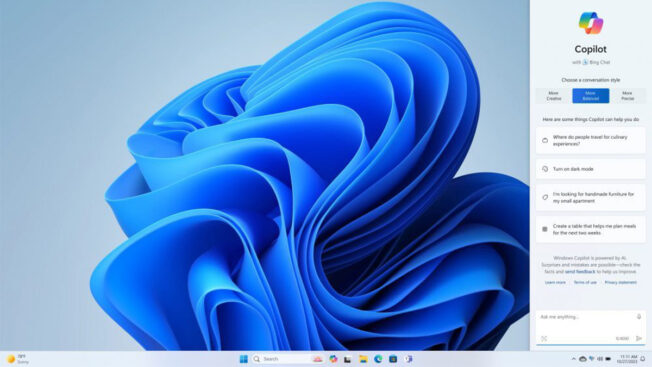Mark your calendar for Mediaweek, October 29-30 in New York City. We’ll unpack the biggest shifts shaping the future of media—from tv to retail media to tech—and how marketers can prep to stay ahead. Register with early-bird rates before sale ends!
Microsoft gave insights into how its advertising business will evolve, including a new AI chatbot embedded into its Bing search engine, at an event in New York today.
The software giant will offer a new ad format within its OpenAI-enhanced Bing chatbot: Compare & Decide Ads will let brands promote themselves as a user is making a decision. For example, a user might ask Bing chat about which car to buy—the answer would reveal information scraped from the web and an ad unit where brands could pay to be among a table of options.
The format, which will be in closed beta in early 2024, follows positive performance by new chat advertising formats released earlier this year, according to Kya Sainsbury-Carter, cvp Microsoft Advertising.
Text ads in chat, which can take the form of a citation, have 1.8% higher clickthrough rates than traditional Bing search ads, and 11% stronger clickthrough rates on shopping ads versus the traditional format, Sainsbury-Carter said. The new Compare & Decide format will sit alongside existing chat ad formats first released in February.
“We’re moving relatively slowly on deciding that some unique formats are relevant. It does need to be data informed. We can’t go and ask an advertiser who is working with less resources … to spend a bunch of time on something that we’re guessing it,” Sainsbury-Carter told Adweek. “We spent the last seven months looking at what the data is telling us and bringing this forth because the data is telling us that this is relevant.”
Microsoft announced the new ad format as part of a wider launch focused on consumer applications of AI—most notably, the company revealed Copilot, an artificial intelligence-powered assistant that will be embedded throughout Windows products. Microsoft will share more details about a version of Copilot for marketers available through the Microsoft Advertising platform in 2024.
The new products are part of Microsoft’s efforts to claim a bigger share of the search market long dominated by Google. Microsoft CEO Satya Nadella said in a keynote at the event that the company was excited to bring “software innovation” to a market “dominated by one player.”
That dominant player is Google, which is currently in court for a Department of Justice case targeting its search business as anticompetitive. Bing’s search market share is 3%, the same as it was in January before the wide launch of OpenAI chatbot features, compared to Google’s 92% market share, according to StatCounter.
Playing for advertisers’ budgets
Bing’s new technology has not necessarily made up for its relative lack of users among advertisers, two ad buyers told Adweek.
“I don’t think it’s going to be sustainable for brands to keep spending [on Bing] when they don’t get the results they get from Google,” said Max Gomez Montejo, chief marketing officer of search marketing firm The Hoth.
Montejo and Aaron Levy, vp of paid search at Tinuiti, both said their clients hadn’t spent more on Bing in the past year, nor had they noticed performance was significantly different. But Bing is coming up in conversations more with marketers, and agencies are not opposed to using the search engine so long as they have transparency and control, Levy said.
“What kind of reporting are we going to get back?” he said. “How much will we understand vs. ‘give us a credit card and trust us’?”
In addition to the advertising news, Microsoft revealed that Snap and Axel Springer’s Hey_ (hey.bilde.de) are the first public partners of its Ads for Chat API, announced in May, which allows publishers to embed Bing’s chatbot technology into their sites and receive monetization from the ads placed within.








